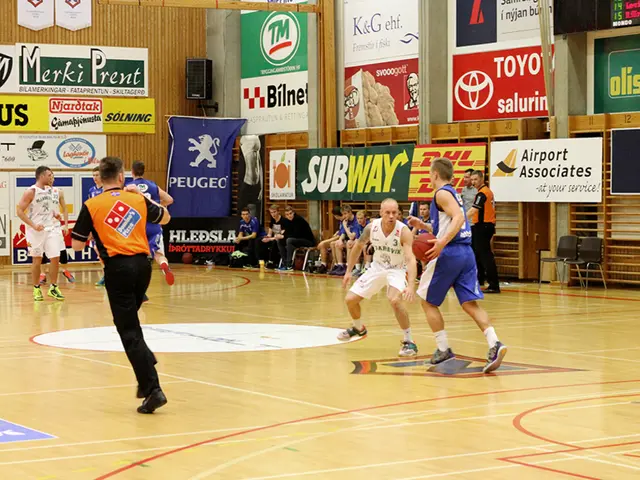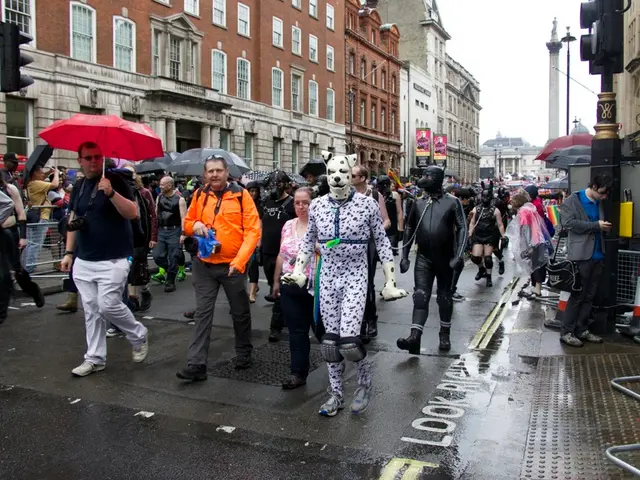Slayin' the System: Trump's Controversial Resettlement of Afrikaners
Amplifying a Minority in Upheaval
US President Trump Aiding White South Africans as Refugees: Examining Their Alleged Persecution
In a daring move that's causing quite a stir, the Trump administration announced plans in February 2025 to fast-track relocation of a select group of South Africans – the Afrikaners – to the United States as refugees. This radical resettlement is set to be the start of a larger endeavor for a persecuted minority, as they flee what they claim to be a Black-led government going after them for their race.
The president has sped up the application process for this group, which comes as a surprise given his administration's stern stance on immigration and refugee policies, including the suspension of programs and halted arrivals from multiple regions, such as Iraq, Afghanistan, and most sub-Saharan African nations[1].
While the news may have sparked curiosity, refugee groups raise valid concerns as to why Afrikaners are prioritized over others[1].
South Africa: A Bustling Rainbow, or a Persecution Nation?
The South African government quickly dismissed the U.S. allegations of persecution against Afrikaners as "wholly false" – the result of misinformation and a distorted perspective of the nation itself. The fact that Afrikaners are among the wealthiest and most successful individuals in the country – one with an over 80% majority Black population – casts doubt on the accusations of persecution[1].
Afrikaners represent a portion of the everyday multi-racial life in South Africa. They hold prominent positions in politics, serve as successful business leaders, and their language is widely spoken and recognized[1]. So, what possible persecution is the U.S. referring to?
Farm Assets: Cut or Flee?
The focal point of these claims appears to be the relatively small number of violent attacks and robberies targeting white South Africans in rural communities[1]. Trump and his South African-born adviser Elon Musk have labeled the South African government's actions as racist, but the real persecution story seem to revolve around these acts of violence.
The U.S. alleges that these attacks are racially motivated and that the South African government is fueling this aggression by not cracking down on anti-white rhetoric from certain political parties and not doing enough to secure the safety of rural communities predominantly inhabited by Afrikaners. Despite the government's insistence that this is not the case and that the portrayal of these attacks is being intentionally mischaracterized, violence against farmowners has been an ongoing issue in South Africa for years[1].
Though rural communities are susceptible to crime due to their isolation and lack of police presence, violent crimes affect all races across South Africa. Despite what the U.S. claims, the government opposes the notion that white people are being unfairly targeted or persecuted, and rural farm attacks are simply a piece of South Africa's struggle with violent crime[1].
Affirmative Action: A Double-Edged Sword?
The Trump administration has also sought to blame South Africa's affirmative action policies as discriminatory against whites. This claim has been widely discredited due to the lack of evidence supporting it. However, some Afrikaner groups see these policies as limiting their opportunities in South Africa, with the potential that their land might be targeted under the expropriation law aimed at promoting more equitable land distribution[1].
Though white South Africans have long voiced their concerns about discrimination, the fact remains that Afrikaners form only a portion of the approximately 4.5 million white people inhabiting South Africa and are not the only target of controversial legislation or practices[1]. However, the Trump administration's refugee program is tailored specifically to Afrikaners, creating resentment among other white South Africans and accusations of bias[1].
Numbers and Arrivals: Coming to America
Despite the lack of transparency surrounding the application process, it's rumored that tens of thousands of Afrikaners have expressed interest in relocating to the U.S.[1]. It remains unclear how many of these applicants have been granted refugee status, but it's been confirmed that a group of more than two dozen Afrikaners from four families will be arriving in the U.S. on March 1 at Dulles International Airport[1].
Only time will tell whether this controversial move by the Trump administration does indeed provide a safe haven for these white South Africans or merely further ignites the flames of racial tension and political strife on both continents.
- The Trump administration's plan to relocate Afrikaners to the United States as refugees has caused a significant stir in politics.
- Afrikaners are fleeing South Africa due to claims of persecution by the Black-led government, a situation the government denies and labels as misinformation.
- Despite the administration's hardline stance on immigration and refugee policies, Afrikaners are being prioritized for relocation.
- Critics question why Afrikaners are being prioritized over other refugee groups.
- South Africa is a multi-racial nation with Afrikaners holding prominent positions in politics, business, and language.
- Violent attacks and robberies targeting white South Africans in rural communities is a focal point of the U.S.'s claims of persecution.
- The South African government denies that it is fueling aggression against Afrikaners, stating that the portrayal of these attacks is being intentionally mischaracterized.
- Despite the government's insistence, violence against farmowners remains an issue in South Africa.
- The Trump administration blames South Africa's affirmative action policies as discriminatory against whites, a claim widely discredited.
- Some Afrikaner groups see affirmative action policies as limiting their opportunities in South Africa.
- The Trump administration's refugee program is tailored specifically to Afrikaners, causing resentment among other white South Africans.
- Tens of thousands of Afrikaners have expressed interest in relocating to the U.S., with a group of more than two dozen expected to arrive in March.
- The future remains uncertain regarding the impact of this controversial move on racial tension and political strife on both continents.
- Car accidents, fires, and sports are part of the general news that the public often follows.
- Crime and justice, including war-and-conflicts, migration, and policy-and-legislation, are significant topics in the news.
- Sports such as football, hockey, golf, sports-betting, European leagues, basketball, NBA, NHL, racing, premier-league, tennis, auto-racing, and mixed-martial-arts are popular news items.
- Horse-racing and grand-prix events also form part of the sports coverage in the news.
- Misinformation about the relocation of Afrikaners to the U.S. is a concern, as it can impact public opinion and influence policy decisions.








